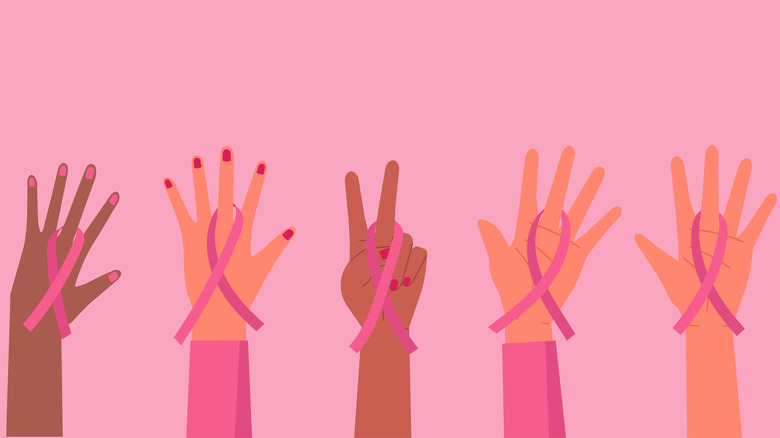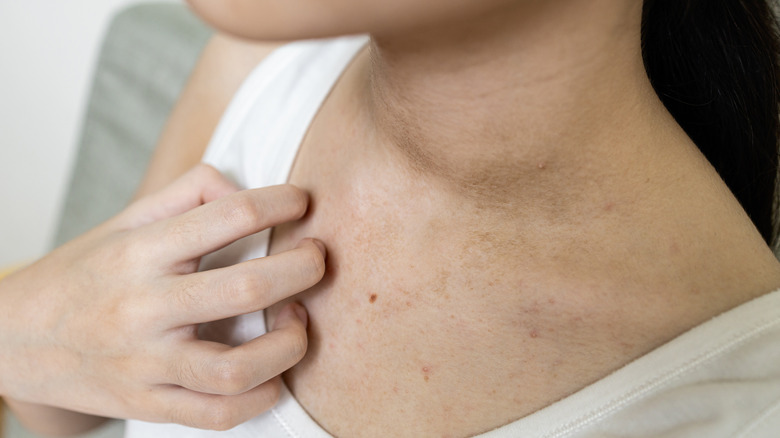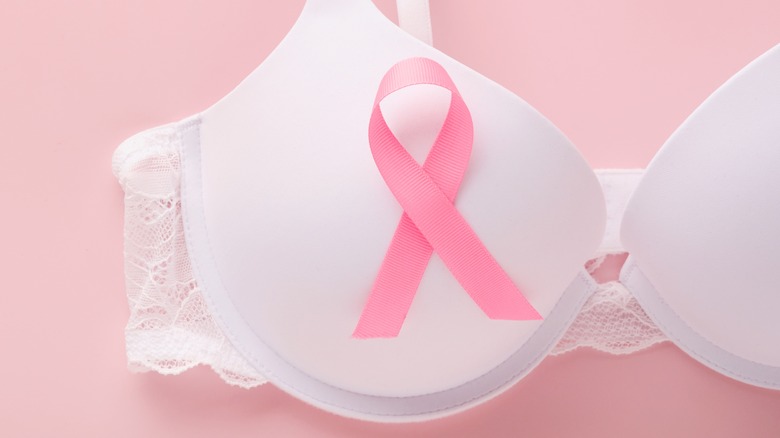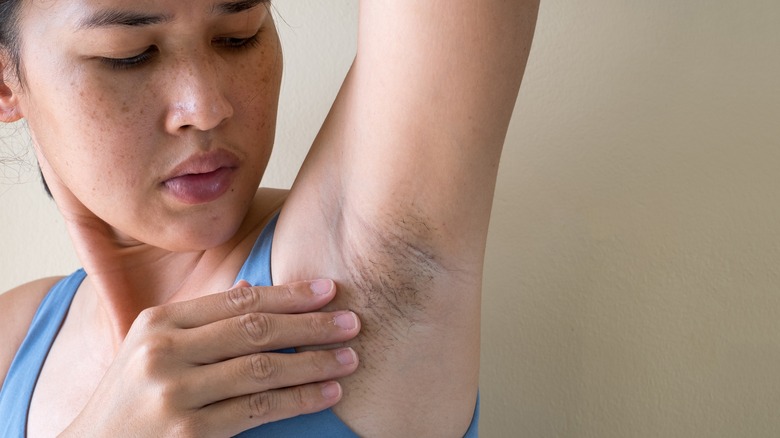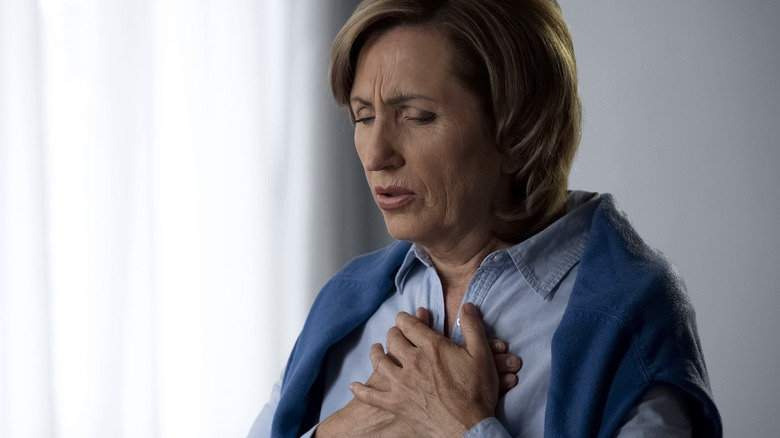11 Unexpected Symptoms Of Breast Cancer
More than 3.8 million American women have a history of breast cancer, and approximately 2,700 new cases are estimated to be diagnosed in men in 2022 (per BreastCancer.org). Additionally, breast cancer diagnoses have been steadily increasing by about 0.5% each year, according to the American Cancer Society. These statistics are alarming, but they also serve as a good reminder to be proactive when it comes to screening yourself for breast cancer with breast self-exams.
Finding a lump is one of the most common ways to catch breast cancer early, with as many as 40% of breast cancers in women identified this way (via the National Breast Cancer Foundation, Inc.). However, there are a number of other symptoms that you might experience with breast cancer, even if you haven't detected lumps with self-exams. Thus, it's crucial to be aware of them, so that you can discuss your concerns with your doctor. Here are some of the unexpected symptoms of the disease.
Changing breast skin
According to the American Academy of Dermatology Association, your skin can tell you a lot about your health and the underlying conditions you might have. For instance, discolorations in the skin can signal circulation problems or liver disease, while rashes can be signs of an array of medical conditions. When it comes to breast cancer, the skin on your breasts can be just as telling.
Susan G. Komen explains that itchy or scaly rashes on the nipple can sometimes be a sign of breast cancer. Also, skin on the breast that's warm to the touch or darkened may be a symptom. Skin changes can be a particular indicator of a type of breast cancer known as inflammatory breast cancer. According to the American Cancer Society, inflammatory breast cancer may cause the breast to feel abnormally itchy. Some people also experience redness on more than one-third of their breast. The National Breast Cancer Foundation, Inc. suggests completing a visual inspection of your breasts during your physical self-exam to spot any skin changes.
Unexplained weight fluctuations
Weight fluctuations are commonly associated with breast cancer treatments such as chemotherapy, which can cause weight gain. However, weight gain can happen in about 80% of women who have breast cancer, even when they haven't yet been treated, and this weight fluctuation can be much more common in women who are currently menopausal (via Sarah Cannon).
Inexplicably losing weight may also be a sign of breast cancer, especially when breast cancer has returned in another part of the body far from the original cancer (per Mayo Clinic). However, any secondary breast cancer — the kind that spreads to other body parts — may also lead to weight loss without trying and an abnormal loss of appetite (per Breast Cancer Now).
One 2021 study published in Breast Cancer Research found a relationship between breast cancer patients with weight loss and an increase in death from the condition, with some patients experiencing rapid weight loss as much as 30 months before death.
Nipple leakage
According to an article in the International Journal of Preventative Medicine, nipple leakage is a potential breast cancer symptom that's unfortunately often overlooked as something normal in women. For instance, some women experience nipple discharge when pressure is applied to the breast or nipple, as a result of hormonal changes, or between periods of breastfeeding (per Westmead Breast Cancer Institute).
Although not a common breast cancer symptom, nipple leakage may be one more warning sign you have to signal something isn't right. The International Journal of Preventative Medicine article says that nipple discharge tends to err on the abnormal side of things when a woman isn't currently pregnant and hasn't breastfed for at least two years. Additionally, it's not until after experiencing nipple discharge for a while that women may begin noticing other symptoms of breast cancer, like itchy or painful nipples and breasts, making leakage an important early warning sign to take action on.
Changes in breast shape or size
If you've recently noticed changes in the shape or size of one or both breasts, it's worth keeping an eye on those changes. Many women do experience periodic changes in the size or shape of their breasts, particularly during their menstrual cycle, pregnancy, or periods of breastfeeding. Menopause and birth control can also cause breast changes (per Breast Imaging Victoria). However, Cancer Research UK says that if your breasts are looking or feeling noticeably different outside of your usual monthly cycle changes, it could be a cause for concern.
In addition to breast changes, you might notice differences in how your nipples look. Cancer Research UK notes that nipples changing positions, like sinking into your breast or turning inward, can also signal breast cancer. Again, completing breast self-exams and becoming familiar with your breasts' usual shape, feel, and look can help you identify when there might be a problem you should discuss with your doctor.
Feeling drowsy
You may only think that fatigue is a symptom of breast cancer treatment, which it absolutely can be. However, Medical News Today adds that it can also be a symptom of the cancer itself, often because of hormonal changes that people with breast cancer experience. Overwhelming tiredness can also stem from the mental health impact of receiving a diagnosis or being stressed about your health.
Breast Cancer Now explains that fatigue can last throughout the day and cause physical and emotional effects, such as not doing things you enjoy or making it difficult to accomplish your usual tasks. If you are experiencing fatigue that's affecting your day-to-day activities, with or without a breast cancer diagnosis, speak with your doctor. Doing so may help you catch cancer early. Your doctor may also suggest things to try, like making over your diet or addressing underlying health conditions, to improve your overall energy levels.
Dimples on the breast
The skin on your breast can certainly change if you have breast cancer in terms of itchiness, scaliness, redness, or warmth. But something else you may notice, even without those symptoms present, is dimpling of the breast skin. In other words, you may see small crevices form on your breasts, similar to how the peel of an orange or grapefruit looks. Breast cancer can block the usual transport of lymph through lymph vessels in the breast, which causes the skin to dimple (per Healthline).
The Moffitt Cancer Center explains that this phenomenon may be one of the first signs you notice if you have breast cancer, because you may see your breasts daily as you change or shower. This gives additional proof to the fact that breast self-exams can be an essential part in early detection, especially if you take care to thoroughly inspect your breasts in the mirror before looking for lumps.
Unusual sensations in the breast
Sometimes, breasts give off their own warning signals that something is wrong simply by making them feel different. Whether you're experiencing pain, tingling sensations, or even a strange internal tickle in one or both breasts, your body could be telling you that you need to take action.
According to Susan G. Komen, some people with breast cancer begin feeling pain in one area of a breast that doesn't go away after a period of time. This is in contrast to the come-and-go pain women might experience during their menstrual cycle. Additionally, Healthline says that, although rare, tingling in the breast can be a symptom of breast cancer, especially if it's uncomfortable enough to interfere with your daily activities or comes alongside other symptoms (like lumps or skin dimpling). Finally, people with breast cancer may feel what they might describe as an inside-the-breast tickle. While not usually a breast cancer symptom, it is something you should have checked out by your doctor if it worries you (per Cleveland Clinic).
Swelling in the arm or armpit
Not only can a breast swell if you have breast cancer, but you may also experience swelling in your arm or armpit. This can happen when cancer interferes with the lymph node system or invades the breast tissue that extends into your armpit area, making this area another key place to inspect for skin changes and lumps when you complete your breast self-exams each month (via the Marie Keating Foundation).
Sometimes, your lymph nodes around your armpit can swell due to infection, so it's important to remember that arm or armpit swelling won't always be a sign of breast cancer. However, it's still important to make an appointment with your doctor as soon as possible, so that they can complete a biopsy; this can help them determine whether your swelling is caused by cancer (per the Cancer Center of Southern California). According to a case study published in the Journal of General Internal Medicine, not determining the underlying cause of arm swelling — usually in just one arm — "can lead to misdiagnosis or a significant delay in diagnosis and treatment."
Bone pain, especially when resting
According to Breast Cancer Now, cancer starting in the breast can spread to bones as secondary or metastatic breast cancer. Most commonly, bones in the spine, pelvis, skull, ribs, or upper arms and legs become affected by this spread. Pain can be a sign that breast cancer has spread to bone, especially when it occurs in the upper arms and legs. It's even more common for the pain to be felt at night during sleep or while lying down to rest.
BreastCancer.org adds that new, sudden onset pain can also be a warning signal that breast cancer has spread to bones. Sometimes, this can even mean that a bone has broken due to the spread. Additionally, weakness or numbness may accompany the area of the body in which you feel pain, especially if the cancer has spread to the spinal cord and begins to cause spinal compression. A doctor may use various tests, like x-rays and MRIs, to rule out other conditions or diagnose metastatic breast cancer based on the pain you're experiencing.
Respiratory problems
According to the Cancer Treatment Centers of America, shortness of breath can happen with several cancers, especially in their advanced stages. However, breast cancer is one that most commonly carries this symptom and other problems related to your respiratory system, like chest tightness or uncomfortable breathing. This can occur when tumors block and cause inflammation or interfere with the lungs and air passageways.
Sometimes, breathlessness can happen to people with breast cancer when the cancer cells block the lungs' lymph channels. This issue can cause severe coughing in addition to shortness of breath (per Breast Cancer Now). Although Breast Cancer Now says that breathlessness related to breast cancer usually doesn't cause further issues, it may increase your anxiety, which can make breathing harder. It could also lead to respiratory infections, so speak with your doctor if you believe that your breathing is becoming more difficult or you're experiencing other symptoms of chest infections.
Insomnia and other sleeping difficulties
An author manuscript published in Drug Discovery Today: Disease Models states that as many as 70% of newly diagnosed or newly treated female breast cancer patients experience insomnia symptoms. Women with insomnia symptoms generally report that they find it difficult to get back to sleep after waking, wake up several times a night, or don't get enough sleep. Additionally, some breast cancer patients with insomnia symptoms prior to their diagnosis report that they've had worsened symptoms after getting diagnosed.
Why is there a link between sleeplessness and breast cancer? According to BreastCancer.org, the anxiety of a diagnosis can be enough to keep some people awake at night. One 2019 study published in Sleep found that breast cancer-related insomnia may affect a person's outcomes with treatment, making it crucial for insomnia in breast cancer patients to be treated properly through effective methods like cognitive behavioral therapy. Cognitive behavioral therapy helps people with insomnia change habits affecting their sleep, such as participating in stimulating activities before bedtime or using their bed a lot for activities other than sleep (via Mayo Clinic).

